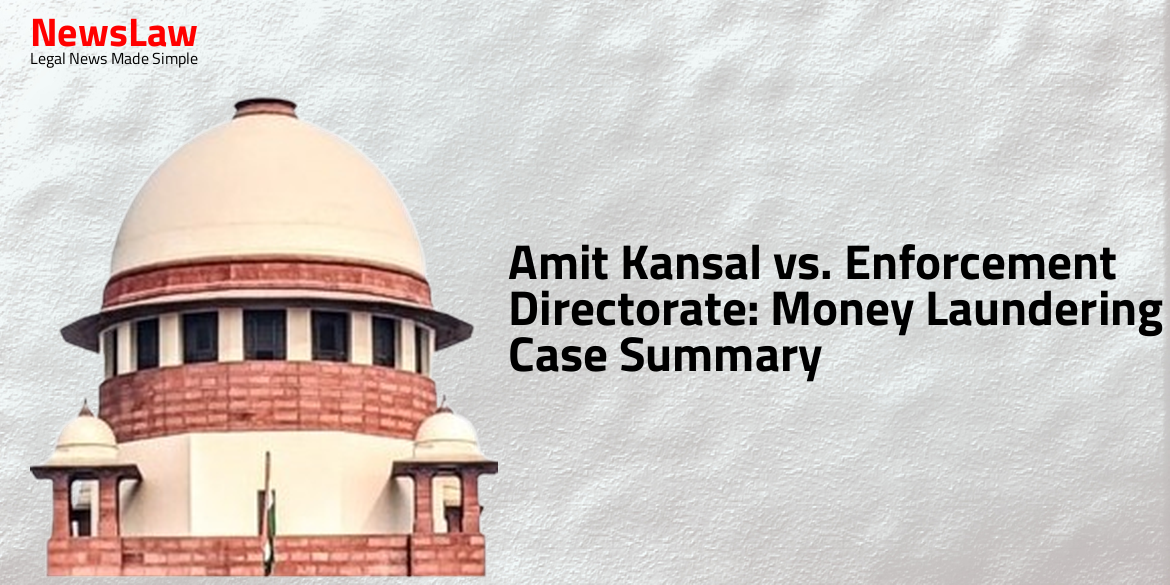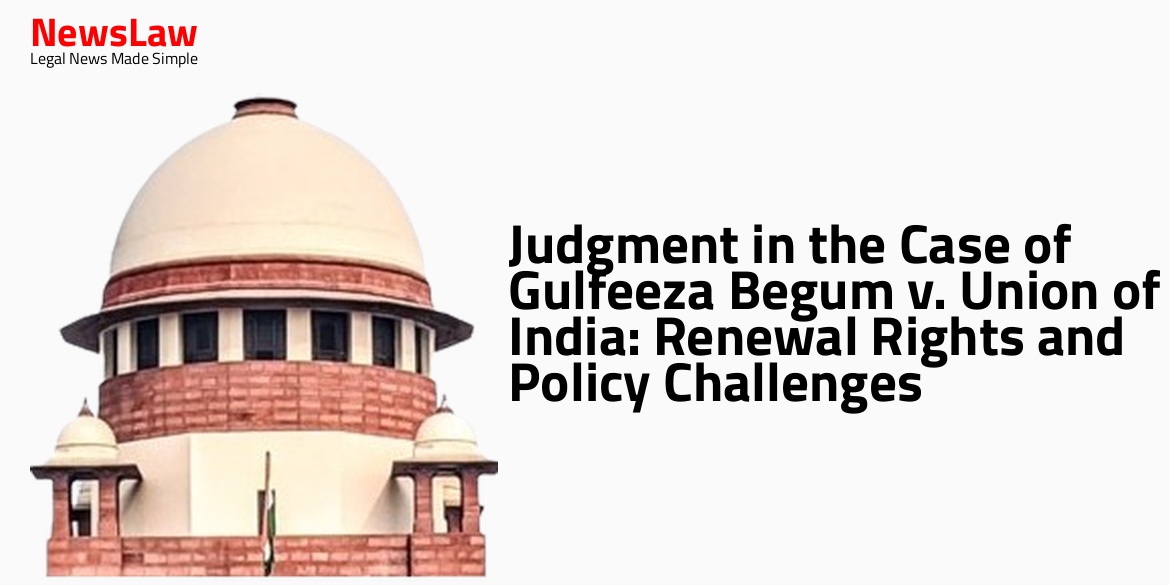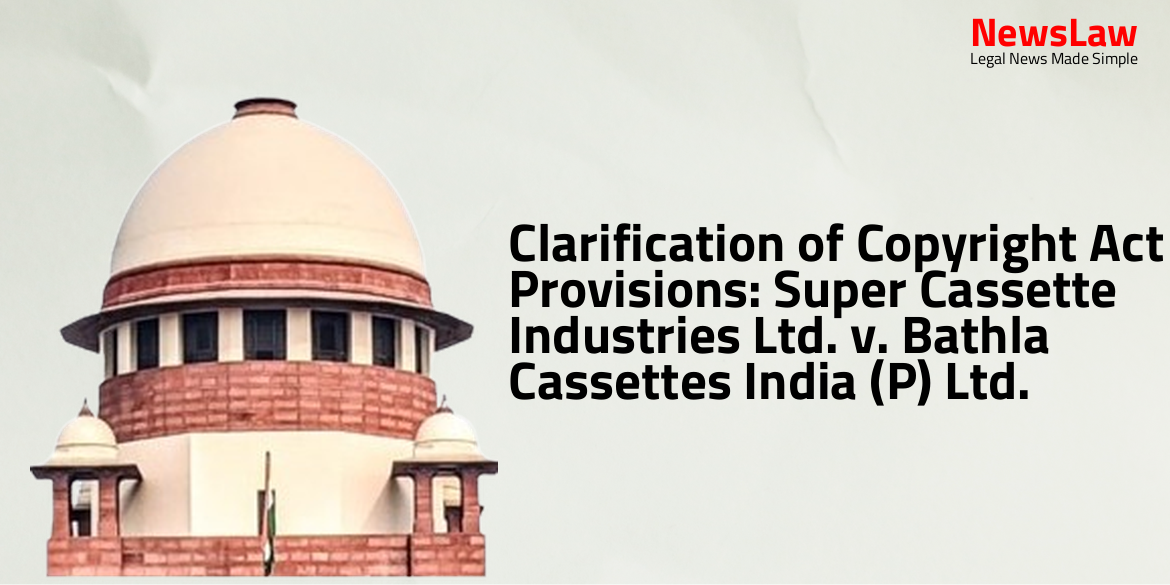The Delhi High Court recently delivered a significant judgment in the case involving Amit Kansal and the Enforcement Directorate. The court considered various aspects related to money laundering and judicial custody, highlighting key legal provisions and observations. This summary provides insights into the court’s decision without mentioning the specific parties involved.
Facts
- The applicant, who is the nephew of accused Amar Chand Gupta (A-2), played a vital role in the conspiracy
- The applicant was involved in creating bogus transactions through his entities Kansal Enterprises and Munshi Ram and Sons
- The applicant was alleged to have induced indigent people to open paper firms to accommodate entries for M/s SBBEL
- The applicant was involved in predating indigent people as entry operators
- A complaint was filed against 47 persons including the applicant for money laundering in connection with M/s SBBEL
- The applicant was arrested on 27.08.2022 and has been in judicial custody since then
Arguments
- Applicant accused of using cheques of paper entities to purchase jewelry in the name of family members.
- Maintaining transactions with paper entities under fake sale and purchase.
- Applicant not named in chargesheets for scheduled offences.
- Primary evidence against applicant are statements under Section 50 of PMLA Act.
- Applicant implicated based on statement under Section 50 of PMLA Act.
- Applicant allegedly assisted in money laundering by accommodating bogus transactions.
- Applicant allowed to become an approver in the predicate offence.
- Bogus sales and purchases by applicant’s firms alleged.
- Applicant’s status as approver in other FIR not relevant in present PMLA complaint.
- Reference to various legal cases cited by ED Special Counsel.
- • Learned Special Counsel for the respondent argued that the applicant was directly involved in projecting the proceeds of crime as untainted money.
- • The applicant in the predicate offence stands discharged once granted pardon as an approver.
- • The applicant joined the investigation multiple times and cooperated with it.
- • Reference was made to Section 44 of the PMLA regarding Special Courts and cognizance of offences under the act.
- • Allegation of pick and choose by the prosecution in citing the applicant as A-42 among other accused in the complaint.
- • Examples provided where individuals connected to the applicant were treated differently in the chargesheet despite involvement.
Analysis
- Section 132 of the Indian Evidence Act, 1872 provides protection to witnesses from arrest or prosecution based on their answers, except for giving false evidence.
- Engaging in money laundering or assisting in such activities related to proceeds of crime is considered an offense.
- Money laundering can be a continuing offense regardless of the timing of the scheduled offense.
- Special Courts trying scheduled offenses or money laundering must follow the procedures of the Code of Criminal Procedure.
- Money laundering is treated as an independent offense connected to proceeds of crime from a scheduled offense.
- The jurisdiction of a Special Court is not dependent on orders related to the scheduled offense during investigations or trials under the Prevention of Money Laundering Act.
- The trial of scheduled offenses and offenses under the PMLA is not considered a joint trial.
- Grant of pardon under Section 306 Cr.P.C. does not automatically result in acquittal in the offence under PMLA unless the accused seeks pardon for that specific offence as well.
- A person granted approver status under Section 306 of Cr.P.C. is legally bound to answer relevant questions even if the answers may incriminate them.
- The case of the applicant must be considered in light of Section 45 of PMLA.
- The classification of offenders involved in money laundering under PMLA is deemed reasonable.
- The court must analyze whether accused individuals possess the necessary mens rea at the bail stage.
- The existence of proceeds of crime is dependent on the occurrence of a scheduled offence.
- The property considered as proceeds of crime must directly or indirectly result from criminal activity related to a scheduled offence.
- If the prosecution in the scheduled offence ends in acquittal of all accused persons, then the scheduled offence ceases to exist, and no one can be prosecuted under PMLA.
- The Parliament’s understanding and reaction to money laundering activities must align with fairness, reasonableness, and the objectives of the 2002 Act.
- The applicant has been in judicial custody since 25.08.2022 and has undergone incarceration for approximately one year and nine months.
- There are sufficient evidence against Shri Amit Kansal that he was directly involved in the process and activity of concealment of proceeds of crime.
- The issue is whether the applicant had the requisite mens rea demonstrating knowledge that the funds routed through the paper companies were part of the loan amount extended to M/s SBBEL by the consortium of banks led by SBI.
- Applicant joined investigation as directed by Investigating Officer
- Applicant cooperated until arrested in current ECIR
Decision
- The application is allowed based on the totality of facts and circumstances of the case.
- If the applicant tries to tamper with evidence, the bail will be cancelled immediately.
- The applicant must not tamper with evidence or influence witnesses.
- Any change of address must be promptly informed to the Trial Court and Investigating Officer.
- Leaving the country requires prior permission from the Trial Court.
- The applicant must cooperate with the investigation when required.
- Provide all mobile numbers to the Investigating Officer and keep them active.
- Copy of the judgment will be sent to the Jail Superintendent for compliance.
- Judgment will be uploaded on the Court’s website.
- Release on bail upon furnishing a personal bond and sureties to the satisfaction of the Trial Court/Link Court.
- The applicant’s residence is stated as A-1/63-B, Keshav Puram, Onkar Nagar, North West Delhi –110035.
- All pending applications are disposed of with this decision.
- The judgment does not reflect an opinion on the case’s merits, and any observations are for the current application only.
Case Title: SANJAY KANSAL Vs. ASSISTANT DIRECTOR, ED (2024:DHC:3765)
Case Number: BAIL APPLN.-1268/2023



